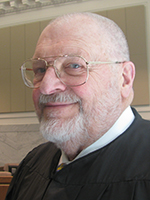Judge Robert J. Bryan
2015 Professionalism Award for the Ninth Circuit

 Robert J. Bryan has been involved with the American Inns of Court movement since 1987, when he served as founding member and first president of the Puget Sound American Inn of Court. The 25th Inn in the United States, it was closely affiliated with the University of Puget Sound Law School. A group of colleagues, including law school dean Jim Bond, encouraged Bryan to get involved. At first, he was reluctant.
Robert J. Bryan has been involved with the American Inns of Court movement since 1987, when he served as founding member and first president of the Puget Sound American Inn of Court. The 25th Inn in the United States, it was closely affiliated with the University of Puget Sound Law School. A group of colleagues, including law school dean Jim Bond, encouraged Bryan to get involved. At first, he was reluctant.
A U.S. district judge for the Western District of Washington, Bryan had been appointed to the Court by President Reagan only the year before. “I was new to the federal bench, and very busy. I was aware of the Inns of Court movement but not immersed in it. The other founding members wanted the prestige of the federal court associated with the new Inn, and convinced me that they would do all the work, so I agreed,” Bryan says. “It has been a great success.”
Although his involvement was tentative at first, the relationship has lasted and deepened. The Puget Sound Inn was renamed the Honorable Robert J. Bryan American Inn of Court in 2004. Nearly two decades after its founding, Bryan continues to hold its monthly meetings in his courtroom.
“It is an extension of what I have always done and believed in—an extension of my bar and law practice, and principles of the judiciary,” he says. “I appreciate the opportunity to have continuing education programs on topics of interest, and to discuss common issues with other lawyers.”
Bryan’s professional destiny may have been predetermined: He is the third generation in a family of lawyers, following in the footsteps of his father and grandfather. Bryan and Bryan was founded in Bremerton, Washington, by his grandfather in 1904; Bryan joined the firm in 1959 after earning his JD at the University of Washington law school. Although he says he never wanted to be a judge, once he had worked to get a third seat on the county superior court approved by the state legislature, he realized that he might be a viable candidate for the seat. He was appointed by Governor Dan Evans in 1967 at the age of 32.
“I discovered I liked neutrality better than advocacy,” he says, as he handled accident cases, boundary line disputes, wills and probate, and the like. Despite his relative youth, he was well prepared to establish the kind of court atmosphere he sought, having been sent by the state to the National Judicial College for a month of training. He developed a basic philosophy: to be fair, to follow the law, to be polite, and to control the courtroom.
“I tried not to be results-oriented, but rather to let facts and the law drive the decisions,” he says.
Bryan retired from county court in 1984 and joined the firm of Riddell, Williams, Bullitt and Walkinshaw in Seattle as a partner. Upon his appointment to the federal bench in 1986, he saw firsthand the differences in the courts. “The body of law is different in the issues we deal with, although there is some overlap. But methods and behavior don’t change,” he says. With the federal appointment came the opportunity to employ two law clerks, whom Bryan tries to teach by example and discussion.
In a letter of nomination for the Ninth Circuit Professionalism Award, one of those clerks, John Butler, wrote:
From my first day, Judge Bryan’s interactions with others embodied his high standards of ethics and professionalism. [He] invited me into his office and stressed the importance of professionalism and ethics for him and his chambers… [He] passed on to me advice given to him by his father, also an attorney: ‘If you have to ask if something is ethical, it is too close to the line.’ Judge Bryan also required that I read the Code of Judicial Conduct as soon as possible. This adherence to the highest ethical standards typifies Judge Bryan’s conduct in all things.
Bryan took senior status in 2000, and has since served on the board of trustees of the Federal Judicial Center, as president of the Ninth District Judges’ Association, and on the Ninth Circuit Judicial Council. Despite many other professional honors, he was especially pleased to receive this award.
“Judges don’t know how other judges hold court,” he says. “It made me feel good that my experience is appreciated by my peers.”
Jennifer J. Salopek is a freelance writer based in McLean Virginia.
© 2016 American Inns of Court. This article was originally published in the March/April 2016 issue of The Bencher, a bi-monthly publication of the American Inns of Court. This article, in full or in part, may not be copied, reprinted, distributed, or stored electronically in any form without the express written consent of the American Inns of Court.